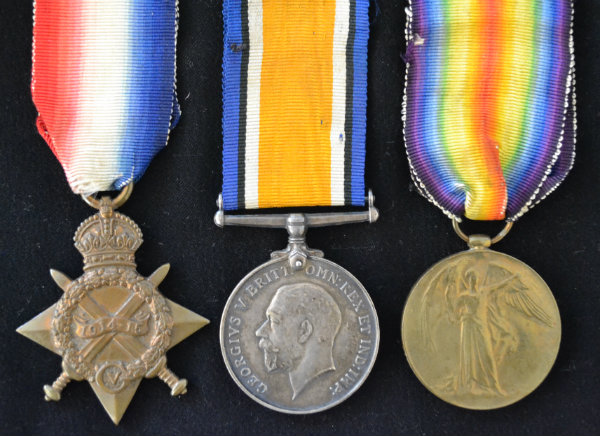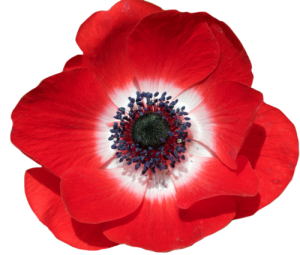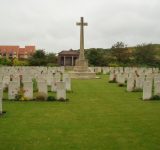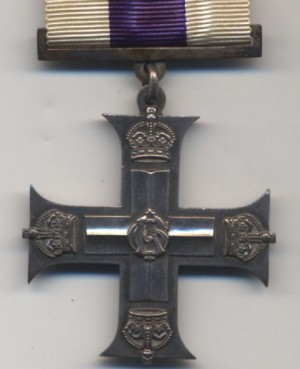Personal Details
John Thomas Jones, born in Whitchurch in 1883, the second son of William and Winifred Jones.
Husband of Lydia Ann (nee Houghton) Jones of 20 Station Road, Whitchurch.
John was on the staff of the General Manager of the Shropshire Union Railway and Canal Company at Chester. He obtained a commission in March 1915 and 6 months later was promoted to Captain. He had been mentioned in dispatches in 1916, and was awarded the Military Cross for Distinguished Conduct and Devotion to duty in 1917.
Military Details
Regiment : HQ Division Train Royal Army Service Corps
Rank : Captain & Adjutant
Service Number :
Died of Illness; France 28th March 1918 Age 35
The Military Cross is the third-level military decoration awarded to officers and (since 1993) other ranks of the British Armed Forces, and used to be awarded to officers of other Commonwealth countries.
The Military Cross is granted in recognition of "an act or acts of exemplary gallantry during active operations against the enemy on land to all members, of any rank in Our Armed Forces". In 1979, the Queen approved a proposal that a number of awards, including the Military Cross, could be awarded posthumously.
Click on the tag below to see details of each recipient.

The 1914 Star (also known as 'Pip') was authorised under Special Army Order no. 350 in November 1917 and by an Admiralty Fleet Order in 1918, for award to officers and men of the British and Indian Expeditionary Forces who served in France or Belgium between 5 August and midnight of 22–23 November 1914. The former date is the day after Britain's declaration of war against the Central Powers, and the closing date marks the end of the First Battle of Ypres.
The 1914–15 Star (also known as 'Pip') was instituted in December 1918 and was awarded to officers and men of British and Imperial forces who served against the Central European Powers in any theatre of the Great War between 5 August 1914 and 31 December 1915. The period of eligibility was prior to the introduction of the Military Service Act 1916, which instituted conscription in Britain.
The British War Medal (also known as 'Squeak') was a silver or bronze medal awarded to officers and men of the British and Imperial Forces who either entered a theatre of war or entered service overseas between 5th August 1914 and 11th November 1918 inclusive. This was later extended to services in Russia, Siberia and some other areas in 1919 and 1920. Approximately 6.5 million British War Medals were issued. Approximately 6.4 million of these were the silver versions of this medal. Around 110,000 of a bronze version were issued mainly to Chinese, Maltese and Indian Labour Corps. The front (obv or obverse) of the medal depicts the head of George V. The recipient's service number, rank, name and unit was impressed on the rim.
The Allied Victory Medal (also known as 'Wilfred') was issued by each of the allies. It was decided that each of the allies should each issue their own bronze victory medal with a similar design, similar equivalent wording and identical ribbon. The British medal was designed by W. McMillan. The front depicts a winged classical figure representing victory. Approximately 5.7 million victory medals were issued. Interestingly, eligibility for this medal was more restrictive and not everyone who received the British War Medal ('Squeak') also received the Victory Medal ('Wilfred'). However, in general, all recipients of 'Wilfred' also received 'Squeak' and all recipients of The 1914 Star or The 1914/1915 Star (also known as 'Pip') also received both 'Squeak' and 'Wilfred'. The recipient's service number, rank, name and unit was impressed on the rim.
Further Information
Report in the Chester Chronicle 30 December 1916 of the military wedding of John Thomas Jones and Lydia Ann Houghton
"On Thursday a quiet wedding was solemnised at the Primitive Methodist Church, Ellesmere Port, the contracting parties being Captain and Adjutant John T. Jones, son of Mrs. Jones of Richmond Terrace, Whitchurch and nephew of Sir Henry Jones, and Miss Lydia Ann Houghton, daughter of Mr. George Houghton of Ellesmere Port. The bride was given away by her father, and looked very neat in a navy blue costume, with silk hat to match, with lovely furs, the gift from the bridegroom, and was attended by Miss Mary Jones, sister of the bridegroom. The Rev. John Swinden was the officiating minister and Mr. T. H. Whitby, an old friend of the bridegroom, was at the organ. Captain Jones is attached to the headquarters, 38th Divisional Train, B.E.F., France with the Royal Welsh Fusiliers, and has been in France nearly 18 months. Prior to accepting a commission in the army he was on the staff of the Shropshire Union Railway and Canal Co. at Chester, subsequent to which he was for several years in the Ellesmere Port Offices. and at both places made a large number of friends, by whom he was highly respected. Before the war Captain Jones was the secretary of the Chester Football Club, and during his somewhat lengthy term of office the team was very successful. The happy couple left immediately after the ceremony by motor for Chester en route to Llandudno, where the honeymoon was to be spent. As the party left the church the few friends who had gathered showered confetti."
Chester Chronicle 30th December 1916
Report in the Chester Chronicle 6th April 1918 regarding the death of John Thomas Jones
"News was received from the War Office on Saturday that Captain John T. Jones had 'died on March 28th, information to follow.' The fact that the deceased officer had only left his home at Whitchurch in the best of health and spirits caused much conjecture, and it was hoped a mistake had occurred. On Tuesday morning his wife and sister received further details, stating he had had violent sickness on the sea journey, and ruptured a blood vessel, being dead when brought into hospital on landing. Universal sympathy is felt with his wife and sister, and much regret at the tragic close of a brilliant career. Only on the previous Saturday Capt. Jones was invested with the Military Cross by H.M. the King."
Chester Chronicle 6th April 1918
Taken from Forces War Records
If you can provide any further information on John Thomas Jones please get in touch by leaving a comment below, using our Contact Form or by calling in to Whitchurch Heritage Centre.
Information provided by Terry Evanson Whitchurch, Shropshire and Whitchurch Museum and Archives



